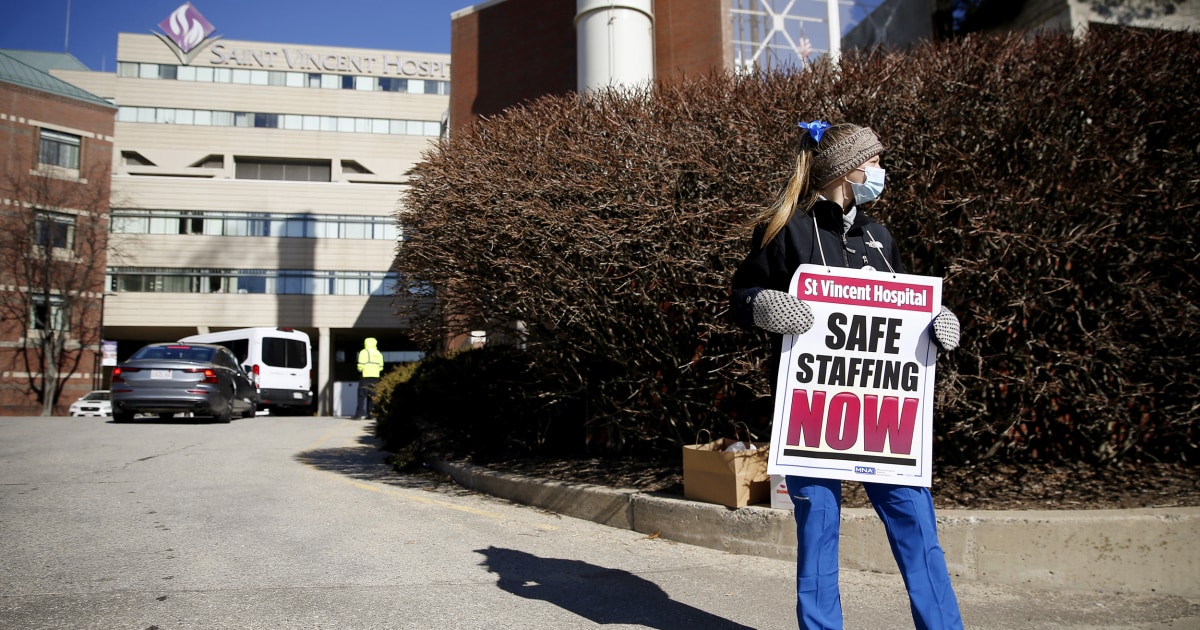
The nursing strike at Saint Vincent Hospital in Worcester, Massachusetts, marked its seventh month Friday, as negotiations between the union and hospital officials continued to deteriorate with no end in sight.
More than 700 nurses walked off the job March 8, citing chronic staffing issues made worse by the pandemic. Despite months of negotiations, the workers, represented by the Massachusetts Nurses Association, said the hospital owned by Dallas-based Tenet Healthcare would not meet their demands. The nurses now hold the record for the longest nurses strike in state history.
“This is not where we expected to be,” said Marie Ritacco, 58, who started her career as a nurse at Saint Vincent in 1983. Ritacco said she and her peers saw assignments getting more intense, with more patients to take care of and less ancillary staff.
The nurses maintain that the nurse-to-patient ratio had been at an unmanageable level, leading to a decrease in the quality of care they were able to provide. The staffing problems started before the pandemic, and union officials said they had been negotiating with the hospital for more than 18 months before voting to strike.
“Once the pandemic hit, care inside that building became exponentially more difficult to provide,” Ritacco said. “They’re not concerned about the workers or the people we care for; they are worried about their profit margins.”
The Massachusetts Nurses Association said nurses were overworked, didn't receive proper personal protective equipment and were sidelined in the name of profit margins before and during the pandemic.
Ritacco described situations where nurses had so much to do in a single shift, they were unable to bathe, turn, wash or walk patients. She said one nurse she knows found herself in a situation where she had to choose between protecting a patient who was going to fall out of a bed or respond to a call from a patient with chest pain — with no backup in sight.
Being understaffed shift after shift, day after day "leads to errors," Ritacco said. "It's how patients develop bed sores and urinary tract infections. Nobody is there to feed them or even to hold their hand."
Covid-19 pushed the nursing staff to their limit while Tenet furloughed workers who could’ve been shifted to other parts of the hospital that needed more help, the union said. Doctors received bonuses, but nurses didn’t, it added.
The length of the strike “is a travesty and serves as an indictment of Tenet Healthcare and their unyielding desire for profit,” Marlena Pellegrino, a nurse at Saint Vincent and co-chair of the nurses bargaining unit, said in a statement.
In August, it looked like the strike would end when the two parties agreed to a contract, but things fell apart over the return-to-work policy.
Saint Vincent has hired some permanent nurses to replace the workers on the picket line and said it couldn't accommodate the nurses' request to return to their exact pre-strike positions. The hospital wasn't going to remove the new nurses from positions they "bravely took during the strike," said CEO Carolyn Jackson.
"The people on the inside caring for patients, travel nurses, other staff, are doing a great job taking the best possible care," she said. Adding that the strike has taken a toll on the hospital, she said, "We have had to reduce services as a result of the strike. In August, we closed 111 beds."
But the hospital has not been able to come to an agreement with the nurses. Jackson said many of the nurses' complaints are overblown and that she believes the strike was started under false pretenses. She said the strike is a concerted effort by the Massachusetts Nursing Association to get Saint Vincent to agree to a maximum patient-to-nurse staffing ratio — an effort the union tried to pass statewide in 2018 through a ballot initiative that ultimately failed.
While Jackson acknowledged work conditions were challenged during the pandemic, she emphasized that according to the hospital, staffing ratios never reached an illegal or dangerous range.
She also maintained that the union’s staffing demands are impossible to meet. "If every hospital across the state went to a 4-to-1 ratio, you wouldn’t have enough nurses," she said. "It would exacerbate an already challenging nurse staffing crisis."
Steve Striffler, a professor of anthropology and director of the Labor Resource Center at the University of Massachusetts Boston, said similar staffing fights have increased in the past decade at hospitals across the country as private equity companies and other outside investors have taken over more hospitals.
“I don’t think it's about anything else except for cutting costs,” Striffler said, adding that the irony of the nursing shortage is that it’s in part created by nurses leaving the industry due to understaffing issues.
“You can only spend so much time in understaffed trenches,” he said.
Referencing what happened at Saint Vincent in August, Striffler said it’s “unheard of for two sides to come to an agreement, after a really contentious strike, and for them, the employer, to say, 'No, we aren’t going to guarantee you can come back to the job you’ve been in.'”
Ritacco said the fact that nurses around the country are experiencing similar issues makes the fight all the more important.
“What Tenet is trying to do is send a strong message that other nurses should not get the idea to do the same thing. It is not lost on us how important it is for us to hold our ground,” she said. “This will be a bellwether, and we are not going to back down.”
"strike" - Google News
October 10, 2021 at 03:30PM
https://ift.tt/3iMEkH4
'This is not where we expected to be': Massachusetts nurses strike hits 7-month mark - NBC News
"strike" - Google News
https://ift.tt/2WheuPk
https://ift.tt/2VWImBB
Bagikan Berita Ini














0 Response to "'This is not where we expected to be': Massachusetts nurses strike hits 7-month mark - NBC News"
Post a Comment